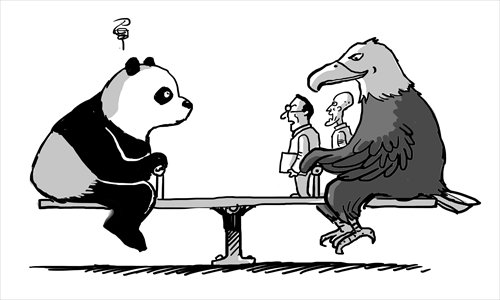China weighty factor in US pivot policy

The discussion of whether US President Barack Obama's strategic shift toward the Asia-Pacific is aimed at China has raised great concerns. I appreciate Robert Manning's mild approach in his article for the Global Times on February 8, "Beijing misreads US rebalancing in Asia." I would like to explain why many Chinese experts believe the US pivot toward Asia is to contain China.
Manning noted that "the US never left the Asia-Pacific. Strengthening alliances with Japan, South Korea, and Australia and building stronger working partnerships with Singapore and other ASEAN states have been ongoing US policy well before President Barack Obama was first elected in 2008." This is one-sided.
Perhaps containing China is not the sole objective of Obama's eastward policy, but the China factor has been playing an influential role more than ever before.
The narrowing gap between China and the US in strength has made the US concerned about its global status. China has become the most challenging country for the US in the region. The US' strategic shift toward the Asia-Pacific is undertaken under this background.
The China factor can be found in US military cooperation with its regional allies. First of all, the military activities of the US and its allies are clearly targeted at China. A joint declaration by the US and Japan openly called for more transparency from China's military. Their regular military drills included exercises modeling the recapture of islands similar to Diaoyu.
Naval forces from both the US and South Korea conducted joint military exercises in the Yellow Sea, which was strongly protested against by China. The US has been hotly discussing marine security issues with countries such as Japan, Australia, South Korea and India, the intention of which is to woo these countries to contain China.
Meanwhile, the US altered the post-September 11 strategy that prioritized relations with marine Southeast Asian countries and with significant Muslim populations. Instead, it carried out military cooperation with countries that China has security problems with.
Last but not the least, the focal point of the US' military exercises and defense cooperation with others is to deal with the Chinese military.
In the past, the purpose of military exercises in East Asia was anti-terrorism or humanitarian assistance. However, in recent years, the US has added joint maritime operations and safeguarding marine channels to the Asia-Pacific marine region.
It has also improved its anti-missile defense network, which is obviously aimed at China's growing missile capabilities.
Manning believes that the US naval presence in the Asia-Pacific region is to "respond to concerns of US allies and partners in the region about China's growing comprehensive national power and its military assertiveness," which is far from convincing.
Undeniably, Asia-Pacific countries have security demands for the US, and the US has been responding to such demands to some degree. Nonetheless, the US pivot to Asia has promoted and strengthened such demands.
The US pivot to Asia is determined by its national interest and global perspective. By responding to regional countries' demand, the US can not only woo more partners to expand its military and political influence, but also deter potential rivals that may challenge its position and interest by getting involved into transnational frictions.
Therefore, the US is using these countries' security demands or concerns to serve its own strategy, and China's rise becomes the reason for it to push its strategy.
In the Myanmar case mentioned by Manning, the dramatic change in the US-Myanmar relations cannot be explained solely by Myanmar's demand.
Generally speaking, the US pivot to the East is a comprehensive and long-term strategy. The reason why China feels uneasy is that the strategic mistrust between the two hasn't been changed even after decades of mutual diplomatic relations.
China and the US are affecting each other. Other Asia-Pacific countries don't want to choose between them. The US strategy adjustment will not and should not bring the region a new "Cold War."
The author is a researcher at the Institute of International Relations of the Shanghai Academy of Social Sciences. opinion@globaltimes.com.cn